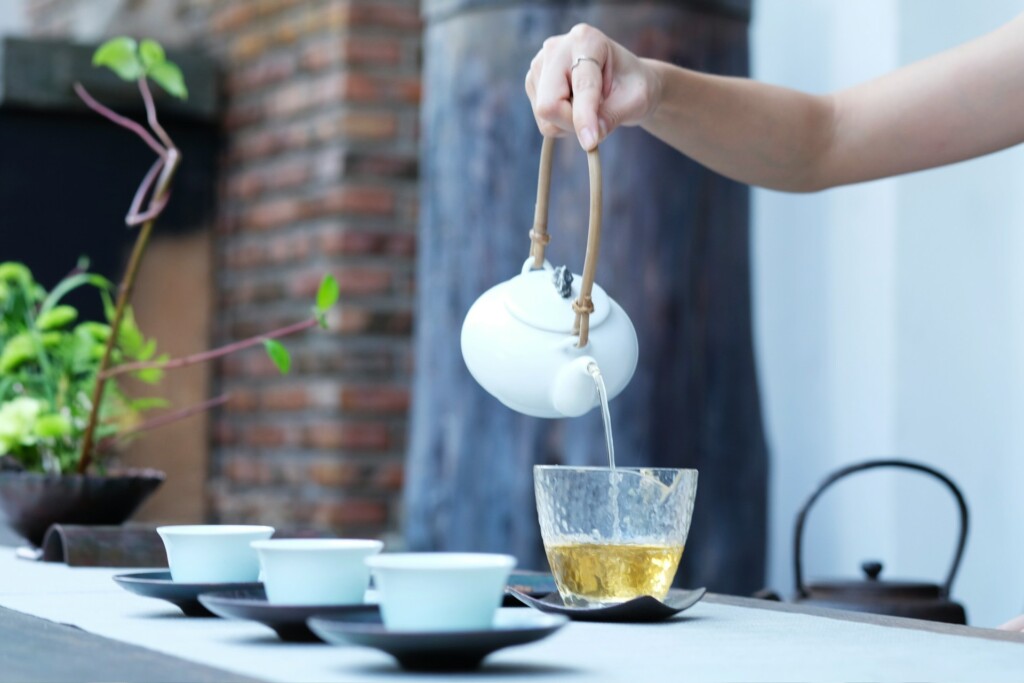In recent years, the wellness community has seen a massive surge in the popularity of essential oils. While they are often associated with aromatherapy and beauty products, they can also be a fantastic addition to your tea.
This blog post serves as a beginner’s guide to using tea oils, providing you with all the information you need to enhance your ritual.
From understanding the basics to practical tips on how to incorporate these potent plant extracts into your daily routine, this guide will help you unlock new dimensions of flavor and wellness.
Understanding Essential Oils
Understanding the intricacies of essential oils can significantly elevate your experience. Extracted from plants through meticulous methods like distillation or cold pressing, these highly concentrated oils capture the essence of the plant’s scent and flavor.
Tea oils can offer a multitude of benefits, ranging from improved digestion to enhanced relaxation. Here are some key points to consider:
- Potency: It is incredibly potent. A single drop is often sufficient to add substantial flavor and therapeutic benefits to your tea.
- Cost-Effectiveness: Given their high concentration, it is a cost-effective way to enrich your experience, providing long-lasting value.
- Health Benefits: Many are rich in antioxidants and have anti-inflammatory properties, making them an excellent addition to your daily wellness routine.
- Safety: Not all oils are safe for ingestion. It’s crucial to research and ensure the oils you choose are safe to consume.
Incorporating oils into your tea routine not only enhances the flavor but also contributes significantly to your overall well-being. Remember to always verify the safety of specific tea oils and herbs before adding them to your cup, ensuring a wholesome and beneficial experience.
Benefits of Using Essential Oils in Tea
Integrating essential oils into your tea offers a myriad of benefits that can significantly enhance your tea-drinking experience. For beginners exploring the world of oils, this can be an excellent way to elevate both flavor and wellness. Here are some key advantages to consider:
- Enhanced Flavor Profile: Adding oils to your tea can make each sip more enjoyable. For instance, a drop of peppermint oil in your herbal tea provides a refreshing, cooling effect that can transform the overall taste.
- Health Advantages: Many oils contain properties that support well-being. Lavender essential oil, known for its calming effects, can help alleviate stress and anxiety when included in your evening tea, making it easier to unwind.
- Aromatic Enhancement: The scent of oils can engage your sense of smell, adding another layer of enjoyment to your tea ritual. This aromatic experience can make your tea time more relaxing and pleasurable.
By understanding these benefits, you can start incorporating tea oils to create a more aromatic, flavorful, and health-supportive beverage. This beginner’s guide will help you discover how oils can transform your daily herbal tea ritual into a more enriching experience.
How to Choose the Right Essential Oils
Choosing the right tea oils can be overwhelming, given the plethora of options available. To simplify the process, start with oils that are generally considered safe for ingestion, such as peppermint, lemon, and lavender. These are versatile and can complement a variety of tea types. Here are some key steps to guide you:
- Opt for High-Quality, Food-Grade Oils: Ensure that the oils you select are of high quality and food-grade. Look for certifications or labels that indicate the oil is safe for internal use.
- Start with Small Quantities: Begin by purchasing small quantities to see how you like the flavor and effects before committing to larger bottles. This approach allows you to experiment without significant investment.
- Pair Oils with the Right Tea: Consider the type of tea you are drinking. For example, citrus oils like lemon or orange pair well with green tea, while floral oils like lavender work beautifully with herbal tea.
Experimenting with different combinations can help you find your perfect blend. By following this beginner’s guide, you can confidently select essential oils that enhance the flavor and health benefits of your tea.
Safety Considerations
When incorporating essential oils into your tea-drinking routine, safety should always be your top priority. Here are some crucial safety considerations to keep in mind:
- Verify Safety for Ingestion: Not all oils are safe to consume. Always ensure that the essential oil you are using is specifically labeled and approved for ingestion.
- Start Small: Begin with just one drop to gauge the flavor and effects. It is highly concentrated, so a little goes a long way. Using too much can overpower your tea’s taste and may result in adverse effects.
- Consult Healthcare Providers: If you are pregnant, nursing, or have any medical conditions, consult a healthcare provider before adding oils to your teas. Some oils may interact with medications or exacerbate certain health issues.
By adhering to these safety precautions, you can enhance your tea-drinking experience while ensuring that it remains safe and enjoyable.
How to Incorporate Essential Oils into Your Tea
Incorporating oils into your tea is a simple yet delightful way to enhance your tea-drinking experience. Follow these steps to create a perfect blend:
- Brew your tea as you normally would, ensuring that the water temperature and steeping time are appropriate for the type of tea you are using.
- Add essential oils by placing a single drop of your chosen oil into the brewed tea. Stir well to ensure the oil is evenly distributed throughout the cup.
- Create blends by combining different oils. For instance, mixing peppermint and lemon oils can give your tea a refreshing and uplifting flavor. Start with small quantities to avoid overwhelming the taste.
- Infuse tea leaves by adding the essential oil directly to the tea leaves before brewing. This allows the flavors to meld together, creating a more harmonious cup of tea.
Experiment with different techniques to find what works best for you. Incorporating oils into your herbal tea not only enhances the flavor but also offers various health benefits, making your tea-drinking experience both enjoyable and beneficial.
Popular Essential Oils for Tea
Enhance your tea-drinking experience with popular oils known for their delightful flavors and numerous health benefits. Incorporating tea oils not only elevates the taste but also provides various wellness advantages. Here are a few essential oils to consider:
- Peppermint Oil: Renowned for its refreshing taste, peppermint oil also offers digestive benefits, making it a popular choice for tea enthusiasts.
- Lemon Oil: This zesty oil is packed with antioxidants and adds a vibrant flavor to any blend.
- Lavender Oil: Known for its calming effects, lavender oil pairs exceptionally well with herbal tea, promoting relaxation and tranquility.
- Ginger Oil: With its spicy kick, ginger oil is excellent for digestion and adds a unique depth to your tea.
When starting your exploration, these oils are an excellent place to begin. Each brings distinct flavors and health benefits, enhancing your overall experience and supporting your well-being.
Conclusion
Incorporating essential oils into your tea is a simple yet effective way to elevate your tea-drinking experience. From enhancing the flavor to offering potential health benefits, these potent plant extracts can transform your daily ritual into something truly special.
Remember to start with high-quality, food-grade oils and use them sparingly to ensure safety and the best possible flavor. Experiment with different combinations to find what works best for you.
If you’re ready to take your tea ritual to the next level, why not give essential oils a try? Their versatility and potency offer endless possibilities for creating delicious and healthful teas that you can enjoy every day.






